"The answer itself doesn't matter. What matters is that you made a choice."
Don't wanna be here? Send us removal request.
Text
Aventurine Is BPD Coded- Some Thoughts
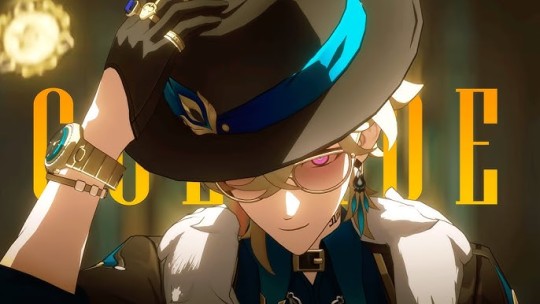

Ahhh welcome back everybody to another installment of 'Rory writes a ridiculously long essay nobody asked for to shine light on characters who exhibit symptoms of borderline personality disorder so that we can learn to recognize symptoms portrayed in media that aren't just 'crazy manipulative abusive ex' and start to treat the disorder with a shred of compassion' !!
A good chunk of you follow me because of my essay I wrote on Reo Mikage from Blue Lock, my beautiful borderline princess, and I am PLEASED to announce that my essay is now the first result when you search 'Reo Mikage BPD' on Google, AND he has since been added to the BPD character database !! Saving the world one baddie at a time, no need to thank me B)
Today, I want to write something out that I've been dying to share. I think Aventurine can be read as a BPD coded character, and I think he would be able to cop a diagnosis should he go see a therapist (which we all know he CLEARLY has not done). I've been puttering around posting this because I've been spending so long on a full, all encompassing analysis of this sick blonde man, but I want to take a quick break and kick my feet over BPD Aventurine, so I invite you to come kick your feet with me!
Some context before I start:
1.) Borderline representation is extremely important to me. I've got the BPD / CPTSD combo meal, so I'm having TWICE the fun !! But seriously though, it's not easy being viewed as crazy and 'bad' all the time. Trauma disorders are rough enough as it is just to live with / overcome, but it's worse when there are books, forums, blogs, shows, ect. dedicated to hating you and talking about how evil you are. So, I get really excited when I spy BPD-coded characters (especially if they're likable people and not just ghoulish irredeemable villains or manic pixie dream girl characters). Fans, characters, and even Aventurine himself refer to him as 'crazy' 'insane' 'unstable' which only further rang my BPD bells because he's not crazy; he's just traumatized!
2.) I’m not a psych, so I obviously can’t diagnose real people, and don’t use any of this to diagnose yourself (I don't need the scandal!) I do, however, have a masters degree in English and structured the basis of my education and published my thesis on mental health, cluster B personality disorders specifically, so I read and research a LOT. I’m confident enough in my knowledge to diagnose anime characters (lol).
3.) If you're somebody who has a weird hangup about borderlines, feel free to either not read this, or do read it and soak up some useful information! Regardless, I know Aventurine fans can have some really wild takes (/neg) , so believe what you want at the end of the day! This is just my interpretation of what's festering in that sad brain of his. You can disagree all you want to, but what we're not going to do is spread hateful stereotypes or perpetuate negative stigmas about BPD! That's cornball behavior and I will call you out for it ^-^
CW for discussion of death, suicide, self injury, and identity disturbances
Anyways, if you ask me, Aventurine has a case of Beautiful Princess Disorder, and I'd like to explain why <3 So, buckle up! This will be another long one.


First, let me define BPD: it's a personality disorder characterized by a long-standing pattern of instability in mood, interpersonal relationships, and self-image. Though it's coined as a 'personality disorder', I urge you to look at it as a trauma disorder. People most often develop it when they are repeatedly traumatized during their formative years. It actually overlaps a TON with complex post traumatic stress disorder, which is why a lot of us baddies end up with both! (On that note, you could definitely view Aventurine as CPTSD-coded as well! I'm a stinky kinnie so I'll just say he's both <3) I won't preach too much on why it's so necessary to treat borderline as a traumatic stress disorder (since hopefully I'll be focusing my own personal academic research on that and I could yap for HOURS about it lol).
But when we look at BPD properly, it's evident that the basis of this disorder is that these people didn't have the opportunity to learn and foster proper emotional reactions. Because of the recurring traumatic events, sections of borderline's brains are underdeveloped as a result. They have a smaller amygdala and they have reduced volume in the prefrontal cortex, as well as other differences in brain development. I've heard it described as 'you were forced to learn some behaviors that helped you survive at one point in your life (for example, maybe fervent efforts to avoid abandonment, unstable emotional reactions, self harming tendencies, lying, mirroring, etc.,) but now you need to unlearn them, because they��re no longer helping you.' They're trauma responses.
Aventurine shows us a perfect example of the kind of shit that would make someone develop BPD: dude grew up in extreme poverty, was constantly told he was special and he was supposed to bring good luck, watched his entire family and race die in front of him when he was literally still just a kid, was kidnapped and sold into slavery, was forced to murder roughly 34 people while everybody watched him like it was a game, probably went through several other fucked up things while he was enslaved, and then killed his slave owner and was promptly sentenced to death for it. That's...a whole lot of ridiculous trauma that would severely impact somebody's ability to mentally grow and develop correctly. The bulk of his childhood/adolescence was spent with no safety, no security, overwhelming guilt, constant fight or flight reactions, learning how to take on other personas to avoid violence or mistreatment – you get the point. He did not have a normal life and it is absolutely probable that he would develop a trauma disorder from the shit he's been through.
So then, what behaviors/signs does somebody need to exhibit to receive a Borderline diagnosis? The 9 diagnostic criteria for BPD are as follows:
1. Fear of abandonment
2. Unstable or changing relationships
3. Unstable self-image; struggles with identity or sense of self
4. Impulsive or self-damaging behaviors
5. Suicidal behavior or self-injury
6. Varied or random mood swings
7. Constant feelings of worthlessness or sadness
8. Problems with anger, including frequent loss of temper or physical fights
9. Stress-related paranoia or loss of contact with reality
As with my last post, I'm going to organize this based on the 5 immediate traits I think Aventurine exhibits most (you only need 5 out of 9 to receive a diagnosis, so let me cut to the chase and stop wasting your time w my yapping).
Fear of Abandonment:
Aventurine has a habit of wanting relationships and then pushing them away once they get too close. He also clearly has trauma associated with losing people prematurely.
First of all, let's look at Aventurine's tendency to view relationships as transactional. With the expectation that a friendship, partnership – whatever – is mutually beneficial, that generally implies both parties will leave satisfied once the 'transaction' is complete. That’s his parting line in the game, actually! “Satisfied with our transaction, I trust?”
That being said, he's already prepared for people to leave when they're done getting what they want from him. In one trailer (and the game) he refers to himself as "another cog in the machine known as the strategic investment department" and then says, "Your humble servant aventurine at your disposal [...] I can also play the role of ‘friend’ – if needed; Go ahead, use me as you wish, even stab me in the back if you see fit."
This is a very strange thing to say upon first meeting someone LMAO. He's speaking of himself like he's an object, rather than a person. Before the other party even says anything, he's basically saying 'hey btw if you end up disappointing me in some way, i'm already prepared for it!' Establishing relationships with the assumption that the other person will betray you/abandon you/hurt you in some way? Borderline behavior. God forbid somebody does try to break down one of these walls, we'll see Aventurine's second habit to avoid abandonment: pushing people away.
Something people don't necessarily consider is that ‘efforts to avoid abandonment’ doesn't always mean the person is on their knees begging you to not to leave them. It can manifest as someone being very flighty and purposefully cutting ties randomly/pushing people away from them so that nobody is able to abandon them. If you leave first, they can’t leave you, right? This is a very common behavior for borderlines to avoid the pain that comes with being abandoned.
The most notable moment of this, in my opinion, is when Aventurine tries to gaslight himself into thinking that Ratio really did stab him in the back during their ploy against Sunday. As we know, their fighting, bickering, and Ratio's 'betrayal' were all part of Aventurine's plan. When they leave Sunday's office, Ratio immediately asks if he's okay and if he needs help, and Aventurine is very dismissive/a little rude in his response. Ratio is confused because Aventurine is talking as if he wasn't the one who MADE this plan and TOLD Ratio what to do:


Aventurine is basically saying, "Hey babe this is not in the script we talked about! Let's stay on track, remember? You hate me, you betrayed me, and now you're leaving me!" And Ratio is like "Yeah okay but are you good? Because you don't seem good,” but Aventurine's heels are so far in the dirt at this point that he is NOT budging at all. When he's in the Trauma Maze, Future Aventurine grills him on this moment:


I get why this part confused some people; why would Aventurine think this when the plan was his idea in the first place? Because, he subconsciously doesn't want to get too attached to the idea that Ratio might ACTUALLY care about him or want to help him. He's forcing himself to think "no, that's not what he was doing, he was planning on actually ratting me out all along, he was only asking about my wellbeing to get in my head."
However, I think it's evident that Aventurine wants relationships/attention just as much as everybody else does, he just won't let himself have it. To further this idea, I think the lyrics to White Night (the Penacony trailer theme song) are worth looking at (these specifically):
I don't wanna be alone tonightOh, lead me with your altered signThere's no one else left for me to loseHeadin' to the other side, other side
I don't wanna be alone tonightI'll bring you to my best disguise'Cause you don't need, don't need to know the truthLet me rave forever in your life
The song is obviously about Aventurine when you look at the lyrics, but these lines in particular just further my point that this man does NOT like the fact that he's alone. He wants relationships, he wants closeness, but he rejects it at the same time out of fear that he might lose somebody prematurely again and doesn't want to experience being abandoned or being rejected for his personality (his real one or his fake one), which leads me to...
Unstable Self-Image; Struggles With Identity or Sense of Self:
The shift from Kakavasha to Aventurine screwed this guy up REAL bad. A MASSIVE part of Aventurine's character, in my opinion, is his struggle with his identity/sense of self. I mean, he literally had to kill off who he used to be in order to live how he's living now, and he didn't have much of a choice in the matter. Jade sums it up pretty well when Aventurine is sat before her on trial:


Aventurine joining the IPC comes with the price of...well, becoming 'Aventurine'. Since I'm clocking him with a BPD diagnosis, the identity disturbance would have probably happened before this moment, and I think it did. I'll bet it started festering after that first massive traumatic event where he watched his family die and tried to rationalize how that was possible with his 'good luck' (since that was really the only consistent idea he had about himself), and it probably only got worse when he became fixated on the fact that whoever tf he is, he's only worth 60 copper coins (did the math – that's about $3). That's gotta cause some massive identity issues. He's coined as this ‘good luck charm’, this ‘blessed child’, a ‘beacon of hope for the Avgins’, and somehow, he ended up in the absolute worst situation possible while simultaneously dooming all of the Avgins (obviously not his fault, but he thinks it's his fault).
When Jade tells him to pick a new identity, ironically he picks one that is everything he probably grew to hate after his childhood/adolescence.
Associating with the wealthy? The rich were the people who paid to brand him and enslave him. The IPC? Promised to help the Avgins but disappeared when the Katicans invaded, then came back and kidnapped him to sell him as a slave. Now he's both wealthy and a part of the IPC, and you have to wonder how he truly feels about it. We'll look into that more later. Regardless, he's not really 'free' now, even if he isn't technically owned by a master anymore. He's chained to the IPC because this is life now; this is his identity. Where else would he even go? What else would he do? (Die, perhaps?) It's not like he can go home, or go live a peaceful life out on the countryside somewhere. He made 'Aventurine' his entire life and his entire personality. On that note, I really like this quote from his third character story:
“The aventurine, that symbol of power and of the future, is about to be officially handed to him — Yet it would have no more allure or value in his eyes as soon he obtains it, even though he had sought it by putting his life on the line.
He returns to his office in a daze. The aventurine stone emits a peculiar glow on his desk, seemingly congratulating and mocking him at the same time."Was luck truly on your side when you wrestled with fate?"”
Did he really luck out with this one? Comparatively, of course, this is better than his life as a slave, but he essentially just traded his rusted chains for golden ones. Becoming Aventurine might wind up bringing him a lot more pain than it was worth.
Also, the outfit he chose? Covered in gold, fur, and jewels, all materials that somebody who knows nothing about being rich would assume rich people wear in excess. It's evident in his tacky taste (sorry honey I love you so much but the hat is just crazy work you look like a pimp) that he doesn't know anything about how to dress himself. And I bully him for being tacky but it makes sense! He dresses exactly how you'd think an out-of-touch billionaire would dress. Back to his sense of identity: it's very important to establish that Aventurine feels guilty about taking on this persona! That's all 'Aventurine' is: a persona. If he were to die tomorrow, the IPC would dust off that stone and give it to another bozo who would end up being the next 'Aventurine'.
While he didn't initially develop this personality subconsciously and it was a 'choice' to start playing this role (not that he had a plethora of alternative options), the perpetuation is damaging him mentally. He does a good job of keeping up the act, obviously. This theme that his entire personality is just one big act is overarching through the entire Penacony quest, but there's one moment in particular I really liked: when Sparkle is being a jerk and he has this offhand comment about how he's so frivolous, vain, and flashy, and how he'd hate to live anywhere where it rained since his outfit is too expensive to get wet.


Then, we have this interaction in the maze: Future Aventurine brings up the memory of him and his big sister playing dead, floating in bloody water to avoid being killed by the Katicans when they attacked. He mentions that it was his father's shirt, the last one his father left behind before dying, and that it was ruined. Aventurine says it wasn't ruined, and he's always kept it. (I wonder if that's the shirt he wore during his time enslaved?) Future Aventurine grills him and asks ‘why keep it? This new person that you are would never wear something so dirty and old. 'Aventurine' wouldn't want that old rag, it's not worth any money. 'Aventurine' would never splash around in murky water like that; he wouldn't need to.’ Nobody is hunting him, now he's the hunter. Future Aventurine makes the snide comment that he bets Aventurine wouldn't even dare to go outside in the rain, let alone do any of the things Kakavasha had to do, since he's so much more elite now. Aventurine, clearly hurt by the implication, says that even after all this time, he's never changed.


Of course, he hasn't. Deep down, no matter how much he tries to trick himself and everybody around him, he's still the same scared, traumatized boy he always has been. His future self chastises him for having an inferiority complex and mentions that with every gamble he makes, he has his left hand shaking in fear behind his back.
But the constant pull to push Kakavasha down and keep up this act that 'Aventurine' is the real him obviously perpetuated the identity disturbance in him and made it a hundred times worse, to the point where (as Future Aventurine points out) the hole he's dug is basically impossible to climb out of.
Because of this, I interpret Aventurine to constantly be struggling with his identity, not knowing who really exists under all the masks he wears, not knowing if he or anybody around him will ever figure it out. I imagine he feels very empty and unfulfilled, since as I mentioned in the abandonment section, he doesn't want to be alone. But the higher he climbs on the social ladder, the further he can separate himself from other people. This is a classic issue borderlines face. We masquerade as something we think the people around us will like, someone WE might like, but it always ends up leaving us feeling more empty than before.
(This is just an added bonus to chew on, but I got stuck on this line when I played through Penacony:)

Do you think once he became Aventurine and got the money and the resources, he researched toys that normal kids play with? Fancy ones like building blocks, stuff that he would have never been exposed to as a kid? Obviously baby Kakavasha would not know wtf building toys looked like, and I'm sure teenage Kakavasha didn't have the opportunity to browse toy catalogs. But, he recognizes the toy even though he says he's never played with them before. Maybe he considered buying it but decided against it, since it doesn't fit his new persona. Kakavasha doesn't exist anymore, so there's no reason to nurture that part of him. Anyways, just wanted to hurt y'all a bit more. Speaking of hurting ourselves:
Impulsive or Self-Damaging Behaviors + Suicidal Behavior or Self Injury:
I'm combining these two because my points kept blending together, so bear with me lol.
Aventurine is known for being incredibly reckless and putting himself in the path of danger over and over again. When discussing how he tricked Sunday with the Cornerstones, Future Aventurine asks:

I want to exaggerate how crazy it is (i can say that i'm also a bpd baddie) that he smashed his Cornerstone. I don't think a Stoneheart has ever done that before. Their stone is what makes them a Stoneheart. Ratio mentions that without it, Aventurine would be back to being nobody. Remember: that's what makes him Aventurine. You know, the persona that required him to kill off his former identity? Their Cornerstones are more important than the Stonehearts’ lives, as stated multiple times. But that's just it: Aventurine doesn't GAF about his life. He doesn't mind putting his life on the line to pull off his plan because he has that deep-rooted desire to punish himself for everything he thinks was his fault. He gets called out for gambling with his life multiple times during Penacony, and while most of the time it's reduced to him just being crazy (cough, bpd) or just having a severe gambling problem. Extremely hot take, but I think he gambles literally as another way to hurt himself. I mean, look at what he says when you ask about his hobbies:
"There's no denying it, my fascination is with the game of chance... be it the exhilarating rush of triumph or the extensive emptiness that follows, both are worth savoring, time and time again."
Being impulsive and risky, betting his life over and over – it makes him feel alive. He knows the end result will hurt, that he'll have to face that 'extensive emptiness' and the extreme guilt he feels regarding his continued good luck, but he does it anyway.
Speaking of betting, his bets are always 'all or nothing', seemingly every time. Future Aventurine calls him out on always risking everything with every gamble, asking:
"Do you truly believe the greater the risk, the greater the reward?"
Or...do you just not care what happens to you? He doesn't need to risk a lot; he's never lost. He could bet the lowest amount and still win every time, and make a lot of money depending on what everybody else bet. In fact, that would actually be a better strategy in gambling (poker/black jack specifically), because it would insinuate that he's not very confident with his hand and prompt the other players to bet higher, assuming that they'll beat him.
I imagine he gets a shred of dopamine betting everything he has knowing that he'll probably win, but hey, who knows? Then after winning and multiplying everything he has, I imagine that 'extensive emptiness' that he refers to is the feeling of 'oh good, more money. More status. More success. A reminder that no matter what I do, I'm stuck here in this role forever.'
For some reason, he also thinks that taking risks makes him appear more confident and secure. He makes a show of always keeping up the big bets and he boasts about how successful he is, while clutching his hand behind his back thinking 'oh god, is this it? will I finally lose this time?' He brings this up when he's speaking with himself and he says, 'How could a weak person take such daring risks?"
Oh, the delicious irony.
That raises the question, though: if he wants to die so badly, why hasn't he yet? It's not like he had an easy life. He fought very hard to stay alive, so why does he act so recklessly now?
I think at his core, he's scared. Dying is scary. His family is there in the afterlife; would they be disappointed in the person he’s become? At the same time, being alive is exhausting. The constant emotional pain this guy probably deals with every day? It's gotta be heavy.
His behaviors around suicide remind of a classic passively suicidal person with BPD: maybe they don't necessarily want to die, but they're tired. They don't have an active plan, but If something is going to kill them, they're not going to move out of the way.
So, carrying out his Penacony plan makes sense. Of course he’s not completely sure what will happen when Acheron kills him, but because he doesn’t have anything to live for, he’s fine gambling with his life. He makes a show of finally throwing out every last chip, too, no longer clutching them under the table in fear. He was fine with smashing the Aventurine stone because it's not like he was planning on using it after his final show; the little bit of power it had left in it was more than enough.
That being said, we do have to address this little number:

Aventurine attempted several times in Penacony, he admits it flat out. The writers even went sofar as to bold this line specifically! I think this does also go hand-in-hand with him being passively suicidal, since he's pretty sure he'll live when he attempts in the dream, but he's gonna try it SEVERAL times just to be sure. Mentally healthy people wouldn't try it... once, Aventurine!
As if we needed more evidence that Aventurine constantly puts himself in danger, you know I HAVE to mention...the light cone:

n case you haven't read the description for this light cone, let me share it with you:
"You don't believe me?"He (Aventurine) provocatively looks at the man (Ratio) before him, then draws out a revolver, empties its cylinder, and leaves a single shot in the chamber.
"Seems like I'll need to get you up to speed on how I do things if our cooperation were to remain amicable."He pushes the gun into his opponent's hand, spins the cylinder, and points the barrel to his own chest.
He pulls the trigger repeatedly, and the smile on his face remains the same after three empty clicks."Life is a grand gamble, and I'll always be the final victor."
Now what the HELL is this? Mind you, this is the first time Ratio has met this man!!! Imagine you meet your new mission partner for the first time and he puts a revolver in your hand and fires it thrice, then leaves. WHO does that? (...a baddie, perhaps!)
I don't think it's a secret to anybody who has spent a reasonable amount of time around Aventurine that there's something off about him, and that there's a really deep sadness running through him. There's some instances where other characters mention his passive desire to die – A few quick examples I can think of:
The instance in Story IV with Opal:
"Maybe luck won't be on your side this time, and the bill for all your past good fortune will come due [...] But isn't that what you've been longing for?"
Opal implies Aventurine wants to fail on Penacony, which, as we've discussed, is an accurate assumption. Jade says something similar after Aventurine's stunt: when Topaz says the light in his stone went out, Jade replies by saying "he got what he wanted."
Also, I’d like to point out that Ratio must have been anticipating that Aventurine would do something rash, since he wrote that note (doctor's advice) long before he started grilling him after the meeting with Sunday.
It's also worth noting the nod to T.S Eliot's "The Waste Land" (a very long poem about life and death). You get the achievement Sibyl, What Do You Want? after playing through the past of Kakavasha's life, and once you defeat boss Aventurine, you get the achievement She Replied, I Want to Die. I don't think that one needs an explanation, but boy does it hurt! (There's other, smaller nods to him being suicidal, like the Waiting for Godot achievement – Google the story if you're unfamiliar. Not as relevant, but I must mention it bc it makes my english major brain go brrrrr)
Also, overspending/gambling/being loose with money is a very common vice for borderlines to indulge in and harm themselves with. It's also implied that he drinks a decent amount. I counted 6 bottles of SoulGlad in his hotel room just from the angles I could see, and he's shown to be passed out at the bar when Ratio goes to get him before they go on their little date-I mean, mission. Aventurine says 'he must have drank too much', and whether or not that was true is irrelevant since it was a believable enough claim that Ratio bought it.
Borderlines are (usually) self-destructive in some capacity, and while some very annoying people assume it's for attention, it's so much more common for it to be because our inner emotions are just so out of whack. Sometimes, matching the inner pain with outer pain is a way to cope. They might also do it to try and combat-
Constant Feelings of Worthlessness or Sadness:
Probably the most nagging, prevalent feeling Aventurine deals with is the constant feeling of worthlessness. One thing about this man? He hates himself. Like, really hates himself. Take a look at the missions during his maze in Penacony. This one is one of my favorites:

It doesn't get much more on-the-nose than him calling himself a selfish, useless loser. He gets stuck on that word, in particular. Loser.
Aventurine, at his core, views himself as a massive loser. Is that ironic because of how much he wins? Not really. Money and materials are just part of the Aventurine persona. He's 'rich' in stuff, but he's not rich in what he actually wants. I think it's obvious that if he had the option to quadruple his wealth or see his sister again just one more time, we all know what he'd be picking.
The only thing he wants is connection – connection with his mother, his father, his sister, anybody at this point – but he can't have it. His family has been dead for a long while, and as I discussed before, his fear of abandonment and his luck scare him away from forming any other relationships.
This luck, this destiny to be blessed, leads him to reflect on his life a lot and wonder what the hell the point is. He treats himself like some sort of walking curse, because he's convinced that his luck is bound to hurt other people. Every time he wins, somebody else loses. The luck that keeps him safe destroys everybody else around him. As Future Aventurine puts it:

His luck is "built on the pain of someone" else. This perpetuates the constant feeling of guilt, which in turn, makes him feel worthless. Why is it him that's spared every time?
Then, right before you start his boss fight, Aventurine says,
"The architect's flawed stone, of no value at all."
Some people speculate he's talking to the MC when he says this, but I can't help but assume that he's referring to himself. Even if it was directed at the MC, so much of what Aventurine says in his bluffs and boasts are just digs at himself. He's sort of an expert at hating himself, and what do people who hate themselves do if not project? Especially when you consider the fact that aventurine is actually a really cheap, undesired stone. It's like $3 a caret and mostly only used to rip people off and pose as jade. I really don't think it's a coincidence that his character is based around a stone that is, essentially, worthless.
The way that Aventurine is also prone to giving people ridiculous amounts of money/gifts can be read as a frantic effort to keep relationships going and prevent people from leaving him (relating to my points on both his feelings of worthless and his fear of abandonment). He has a skewed view on relationships, since the only value that's ever been associated with him is monetary value and that of his 'luck', which in every context is spoken of as an asset to benefit people he cares about. His sister told him that his luck was 'the most precious wealth' of the Avgins and Jade sees him as an investment that can bring her more wealth because of his luck, but he views it as a massive burden that ends up wrecking everybody around him. So how does he prove to other people that someone as worthless as him should be allowed a seat at the table? Deep down, he thinks that he's still worth 60 red copper pieces, and he's desperate to show other people that he's worth more than that now – even though he doesn't believe it at his core. With all the money he wins now, he can throw it at people and say 'look, look how much money I'm worth now, you want me around because I can buy you anything you want, that's a useful quality in a friend!'
(I did use the 'seat at the table line' as a nod to what his slave master said to him when they were discussing his worth: "Don't forget your place, slave. You're not qualified to be at the table." Which is, painfully, what Aventurine says when you open up chests! He scoffs and says that "it's hardly enough for a seat at the table." :’) )
There is also, of course, Aventurine's overarching struggle with finding purpose in his life. We see a lot of his existentialism during his trauma maze, but at the end of his trauma maze, Future Aventurine finally stops ripping Aventurine a new one and is vulnerable for a second, saying he doesn't understand what he's ever done wrong to have suffered as much as he has.

Then, when he's in the Nihility and he's speaking to Acheron, making the decision on whether or not he even wants to keep going, he asks her:



As I said, he has this conversation with himself in the maze as well, but here he's actually being vulnerable and speaking to somebody else about it: what's the point in being alive if we're just born to suffer? If nothing else, this solidifies the emotional struggle that Aventurine is constantly having. I also think it furthers the idea that he has this nagging sort of emptiness inside of him which is another BPD trait: the feeling that you're empty at your core, and you're constantly trying to fill it with things (friends, money, substances, whatever) but nothing ever works. You worry if anything will ever make you feel 'whole' again, and pair with the the identity disturbance? You're left with a constant feeling of despair.
Other Points:
These are a few other random thoughts I have, inspired by in-game moments but I'm taking them for my own evil fiendish BPD narrative. Take them with a grain of salt.
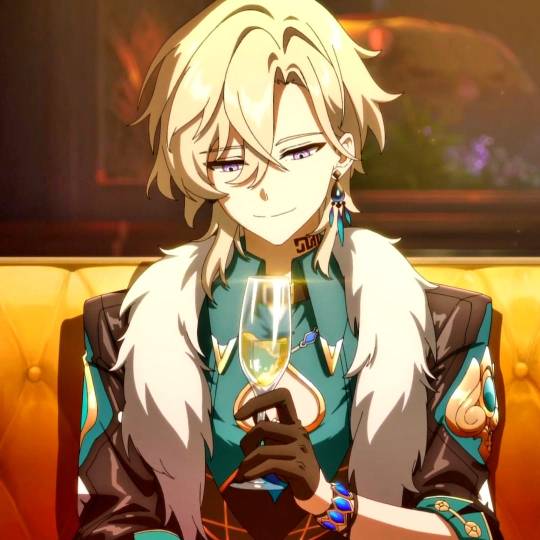
I think the stigma he gets around 'being crazy' is really BPD-coded. Separate from the ridiculous discrimination he gets for being an Avgin where people assume he's a liar and wolf in sheep's clothing (which can this man catch a SINGLE break jfc), he also has this reputation of being crazy, insane, manipulative, cunning, and someone you want to avoid, which is more rooted in his reckless gambling habit and status with the IPC. Living with this reputation of being insane and unstable for...lowkey no reason at all? Very BPD coded. I think Aventurine leans into that stigma to keep people a certain distance away, but it also just ends up making him hate himself even more.
Also, his entire mantra is "all or nothing", which always rang my BPD bells as well. There's not a lot of gray area with him, which is a key trait in borderlines as we often display very black-and-white thought patterns.
In Conclusion:
I think Aventurine is a borderline princess <3
No but actually though, Aventurine is extremely smart, witty, funny, generous, and very kind-hearted, and he also happens to have a lot of BPD symptoms :^) I don't think it does any harm to view him as BPD-coded; in fact, I think it's great to associate positive, fan-favorite characters like this with BPD because it helps to humanize us. Borderlines are not violent, crazy maniacs, they're people who have been severely traumatized and developed some unhealthy habits because of it. They deserve love, respect, understanding, and communication, just as everybody else does.
If you actually made it this far, thank you for reading! I hope I was able to shed some light on Aventurine and his Symptoms. And, as I do in all of my BPD posts, here’s your reminder to kiss the borderline baddies in your life and tell them they’re important to you :^) Living with BPD is exhausting and I know I speak for all of us when I say that. We try so hard every day to stay positive and regulated, and though rewarding, it's exhausting and very hard work. Nothing makes us smile more than some recognition that we're trying our best !!
Till next time xoxo (and shout out to @roxirinart for helping me edit this monstrosity mwahhh mwah)

153 notes
·
View notes
Note
What do you think about Sunday and Aventurine? and their interaction in 2.1, I know Sunday did what he had to do but I just have a strong dislike for him ever since. He is an interesting character though.
I mentioned on a previous ask that I wanted to talk about narrative foils/character parallels, and that ask mentioned Aventurine being similar to Robin and a little to Sunday. But I thought I'd combine that character foils idea with this post about Sunday because...
Aventurine and Sunday are Near Perfect Character Parallels

(Also sorry to Youtuber Fayato who I screencapped this image from; I literally couldn't find a single other good image of Aventurine and Sunday in the same frame!)
In media, the concept of the narrative foil refers to a character who contrasts another character; by setting the two characters and their plots side by side, the audience is better able to understand the traits of the central character.
And by setting two surprisingly similar characters in opposition to each other, it becomes very clear how even those facing similar circumstances can take diametrically opposed paths in life.
First, let's start with the basics:
Aventurine and Sunday are both characters whose real fathers were never in the picture, and who lost their mothers right in front of their eyes to traumatizing events.

They both experienced the violent deaths ("death" in Sunday's case) of their sisters.
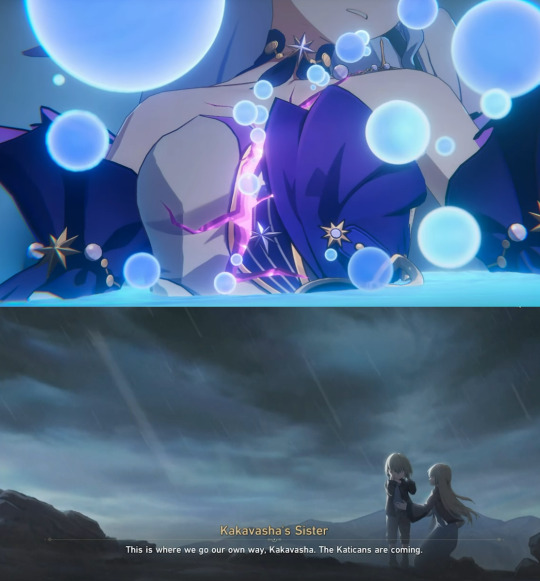
They both were "rescued" by people who intended to use them by growing them ("grooming them" in Sunday's case) into a figure of authority.

They were both told they were "chosen ones" growing up. And yet ultimately this status as the chosen one is in doubt: Aventurine isn't sure if his family's faith is real, while Gopher Wood tells Sunday that Penacony's chosen should have been Robin all along.
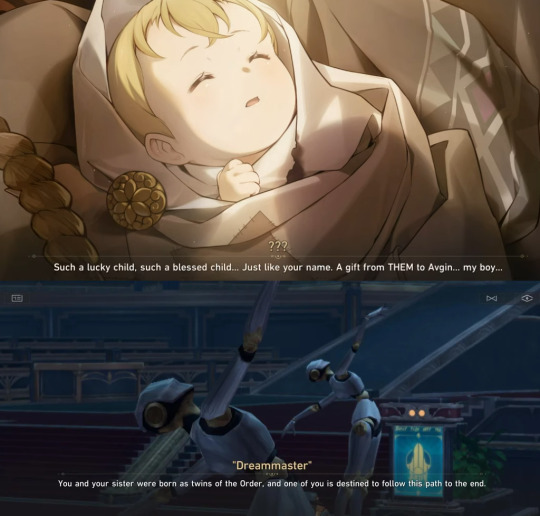
They both became self-sacrificial, Aventurine through his obvious willingness to throw his life away, and Sunday through his plan to remain outside the sweet dream to be its keeper while everyone else got to live in "paradise."

They both are trapped by their situations, Sunday by his inability to leave the cage, Aventurine by his inability to accept the life he isn't able to throw away.

They both became the "villain" of their respective patches and both faced "death."

Personality-wise, they both strongly favor being in control, to the point that their scene together is an aggressive power struggle over each other.

This is how the "future" Aventurine describes himself:

Does it sound familiar? It should, since that's exactly how people describe Sunday.
But they also both prioritize their families, and they are equally altruistic at the core while seemingly self-centered on the exterior.
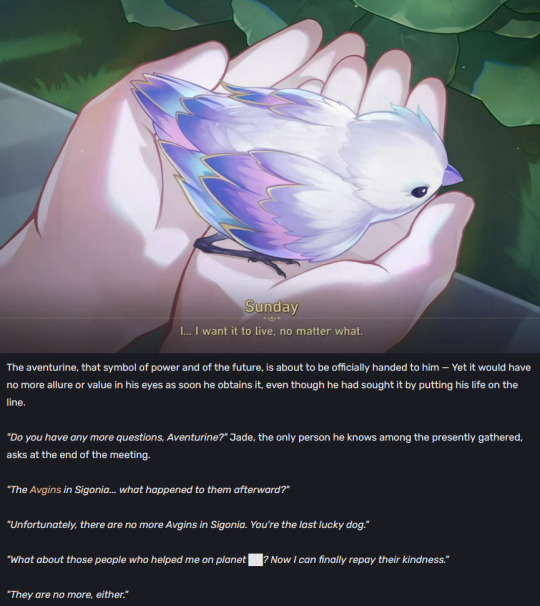
They both, of course, have the blessing of an aeon.

And here's where I'm going to take a massive tangent, but it's important: I do tend to be among those who think there is at least some connection between Ena, the Order, and Gaiathra.
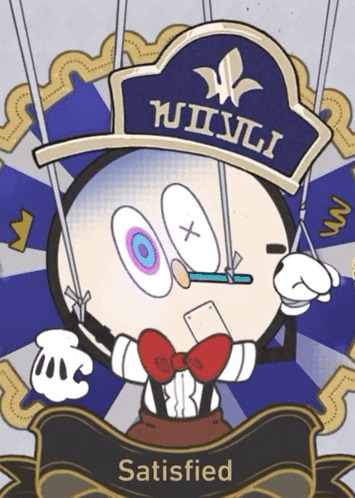
I've heard all sorts of reasons that they can't be two different concepts for the same being, from the whole "Gaiathra is a goddess of trickery and that's not related to order" to the whole "the Order's followers worship with song while Gaiathra's followers specifically don't," but I think something that has been missing from the discussion of Ena and Gaiathra's possible connection is that "Order" as a concept has entirely different definitions depending on which cultural context you approach it from.
The most mainstream modern concept of "Order" is something that is imposed: A power from on high descends to quell the chaos of the mortal world, to "bring order" through guidance to humanity. This is very Abrahamic, very modern Christian, and that is reflected in the imagery surrounding Sunday. Sunday, as a manifestation of the Order's power, believes he will be able to uplift Penacony from the mire, free people from their unfulfilled desires and confusion, and bring about perpetual peace by enforcing his understanding of harmony on the populace trapped in the dream.

Sunday's Order is not the natural state of the world but something that must be carefully cultivated and maintained, a constant battle against the chaotic forces of life and its temptations. This type of "Order" promises an idyllic future, but at the cost of the present freedom of everyone who submits to the law, who must surrender their original fate for a structured sweet dream.
We understand this concept of "Order" because at its core, it's the one that modern societies largely embrace--ruling authorities establish laws that must be followed at all costs, even when they risk the freedoms of individuals, because they ultimately (supposedly) support a greater good. A majority of society adheres to the laws handed down from on-high, and life functions relatively stably.
Yet this conception of "Order" is predicated on the idea that the course of people's lives is decided first and foremost by the people themselves--which is why they can make mistakes, go astray, and need to be shepherded in the first place.
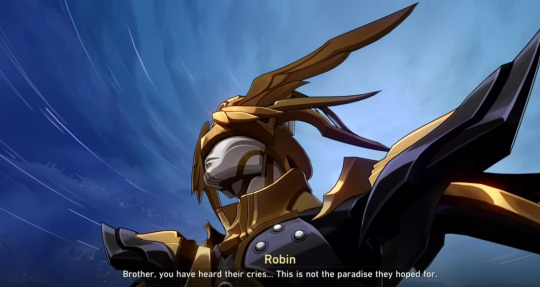
Without imposing structure through authoritarian power, this type of "Order" will crumble away in an instant, because this view assumes that rightness can only created by humanity, and that chaos--not order--is the natural state of existence.
Ena, who holds worlds tidily contained in her hands, who is tangled in puppet strings, who wears a hood like a nun or the Virgin Mary, and who is haloed like a Christian angel, clearly represents this definition of "Order" to a T.
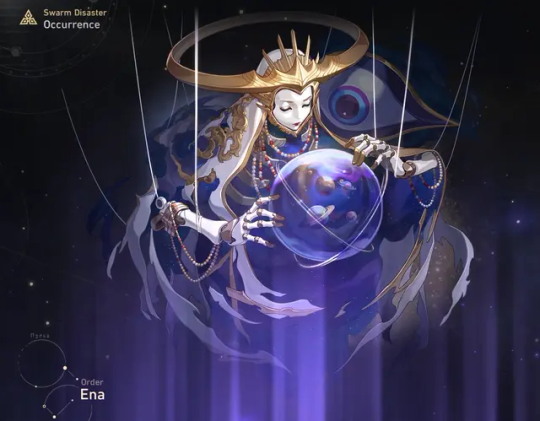
But... this is not how humanity has always defined "Order."
It was not always taken for granted that people had the power of self-determination, and in fact, for many centuries and across many cultures, the concept of "the order of the world" was tied directly to the concept of destiny. Whether a volcano would explode and destroy your entire civilization, whether floods would swallow your city, whether the crops would grow or fail all depended on the pre-made decisions of supernatural powers, who were in turn often personified concepts of the natural world itself. What happened to any given individual, what twists and turns their life would take, whether they would achieve their dreams or not--all these aspects were also predetermined, decided not by the actions of the individual but by fate itself.
Thus, the world and everything in it has a natural order. Things may seem chaotic, they may even seem unbelievably horrible, but all events in existence unfold as they should. We may not understand why, but everything occurs in due course, woven into an endlessly repeating pattern on the fates' loom--spring becomes summer, life becomes death, disasters happen and are healed from, children are born and grow old. If it is your fate to die, you will. If it is your fate to fight and live, you will. To reject this natural order would be as futile as telling the sun not to rise.
The words "order" and "ordained" have the same origin.
Enter Gaiathra. First of all, she is the Star Rail equivalent of a pagan goddess--her worship exists separate of the confirmed existence of aeons, by an uncontacted and non-space-faring race. Even her description, being triple-eyed, evokes other "triple goddess" figures across history, both in modern interpretations (the triple goddess of Neopaganism) and in ancient mythologies (the three fates of Greece, the Tridevi of Hindu culture, etc.).

She is strongly associated with the natural world: The planet of Sigonia is said to be a manifestation of her very body, the rain is her blessing and acknowledgment, and she goes through a yearly cycle of death and rebirth (calling the cycle of the seasons to mind). She is said to be a goddess of both fertility and travel (likely in the sense of nomadic wandering by the time Aventurine was born). Avgin worship of the goddess manifests in the form of sacrificial cyclic knots.
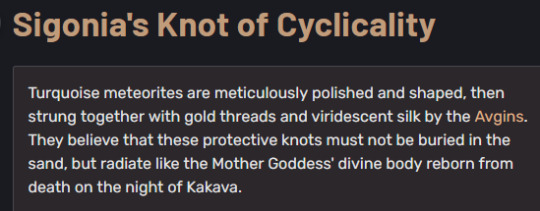
Which might call to mind another pagan culture well-known for their cyclic knots: the Celts, whose famous Celtic knots represent cycles of eternity, unity, and the interconnected nature of life itself.
The Avgin prayer to Gaiathra focuses on elements of a person's life that all might be determined by "fate"--will your blood keep flowing, will your journey be peaceful, will your schemes stay hidden? It hopes that things will be as they should, that the future ahead of you is predetermined to be a good one, and that the cycle of life decided by the goddess will be in one's favor.
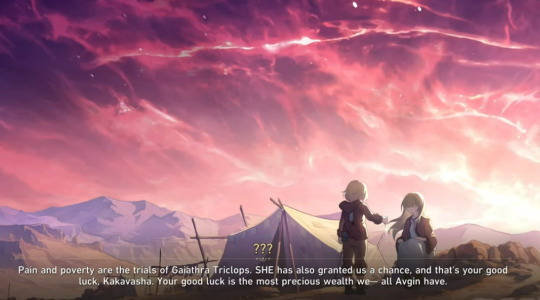
But while the Avgin hope for good things, they also strongly espouse embracing the reality of one's life, with suffering and hardships seen as manifestations of fate that should be accepted as facts of life. It is said that any society blessed by the Order ultimately falls--is it not the natural fate of all societies to one day fall? For mankind to return to the dust and be reborn anew?
Whatever will be, will be.
There is a reason--a logic--an order--to everything that happens.
I hope you can see where I'm going with this: While Sunday and Ena represent the concept of "Order" as a result of self-determination, a power "the strong" can wield to overcome the inherent chaos of reality, Aventurine and Gaiathra represent a different, older concept of "Order" (I can't help but see the entirely separate eye lurking behind Ena?): existence is not inherently chaotic but instead is foreordained, following endless orderly cycles life and death, weal and woe, rise and fall.
PHEW! Okay, so all of that to say Aventurine and Sunday make perfect parallels through a mirror darkly, even when it comes to the blessings they've been granted: One imposes order from on high; one continually rolls the dice despite knowing the inevitable outcome.
Both of their stories are entirely intertwined with the concept of fate, whether by opposing it...
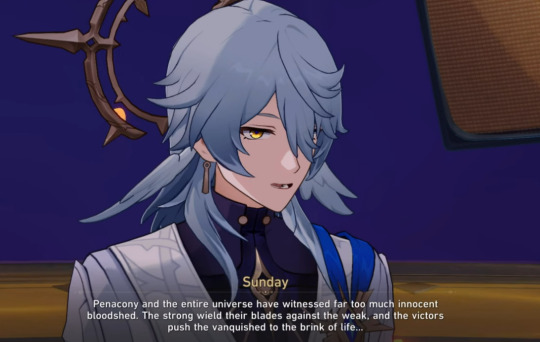
Or accepting it.

And even at the end of Penacony, we leave both Sunday and Aventurine in precarious positions. Aventurine, while ostensibly "victorious," faces another roll of the dice immediately after Penacony, when his future as a Stoneheart is called into question. Yet "fate" comes through for him again--his bet, as always, comes true. His future isn't in question--it is the question itself. What's next? He finally wants to live to find out.
Sunday, meanwhile, ends Penacony's arc in a truly difficult place. He's virtually exiled from the only home he's ever known, a flightless bird tossed out of his cage into cold hard reality. He has to find an entirely new way forward and may even be forced to reckon with an entirely new definition of "Order" itself.
The parallels between these two characters are entirely intentional and very, very blatant, and I am exceedingly interested in seeing whether their paths diverge or continue to reflect similar fates moving forward.
So uhhh... that's what I think of Sunday? 😂
257 notes
·
View notes
Note
I guess it's because his Warp is called 'gilded imprisonment', and the phonecall with Jade where he says 'I don't wanna bet anything just to escape your clutches'.
Kinda makes him a foil to Robin and warped parallel to Sunday in a way I think if you see him as thinking of his job as a gilded cage. It may not really be true, maybe he can walk away anytime he wants I'm sure he has the power and ability to even if hed be up for silencing if he left the Stonehearts, but he has nowhere else to go so he may just be trapping himself there with his own apathy. Hope that made sense lol
Always enjoy reading your thoughts ty for the food 🙏
(Will answer the part about the character foils in a different post because that is a whole long thing of its own!!)
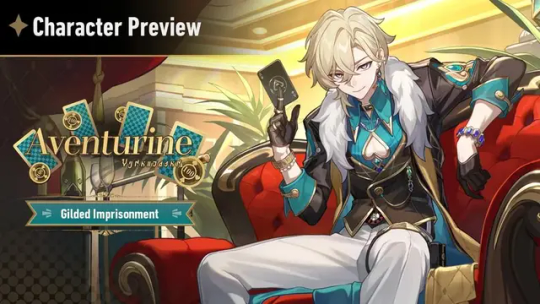
See, I definitely think this is the issue, because I have had people say that exact thing to me "Well his warp is called gilded imprisonment so that has to be referring to the IPC!" Like... Do people think the IPC has a monopoly on the word "gilded" or something? Or that "gilded" can only refer to literal gold coins and not any of the many, many metaphors for being a prisoner to destiny that are swirling around Aventurine?
"To gild" means to "cover thinly with gold." It doesn't mean to create wealth, to imply actual money, or even to relate at all to the concept of "golden handcuffs" (which is what people seem to be mistaking it for). Gilding could more accurately be described as a process of taking something cheap--like low-quality nickel--and plating it over with the thinnest layer of gold, to try to make the item seem much better than it is. Gilding something is often like dressing up a pig--you can make it look pretty on the outside, but on the inside, it's still a pig.

Just the thinnest layer of gold over a darker interior...
There's nothing about "gilded imprisonment" that automatically has anything to do with the IPC, unless you're already coming in with the impression that Aventurine is a prisoner of the IPC. If you start with a preconceived notion of what "imprisonment" means for Aventurine, then and only then do we make the jump to "Oh, this must be in reference to the IPC." Take that preconception out and there's zero connection lol.
Even the Chinese name of the warp, "囚石铸金" (lit. "Prison stones cast [in] gold") and other languages' translation of the banner name (like German's "Stein zu Gold," lit. "Stone to gold") imply that the most important element of the banner is "coating over something bad with something good"--i.e., turning prison walls into gold, turning the "stone" of his dark past into something shining. (This actually makes a nice irony in several languages, because he turned the rocky desert of his homeland and the stone walls of a prison into gold by... earning a Cornerstone and becoming a "Stoneheart"--or, that is, he himself is a "worthless" stone that has been thinly coated over in shiny wealth.)
But personally, if we really want to go by the English name of the banner, I would argue that it is much more likely Aventurine's banner name is a reference to his own troubled relationship with the concept of "blessings" and "destiny" than anything to do with the IPC.

From the beginning of his life, Kakavasha was told he was "blessed" and that he was the "chosen one." He was favored by a goddess, born on the day of her rebirth, and told that he will be the savior of his people. So, we can literally say he's the Avgin "golden child," which is further supported by the constant connection between Aventurine and gold colors (his golden-haired appearance, his mother's gold accessories with him since his birth, the word "Avgin" itself even meaning [golden] honey). So as the "golden child," we have this perception that his power of incredible luck, gifted to him by a goddess, must be a blessing, a good thing.
And yet that's not how it plays out for him. What his family tells him is a blessing ends up functioning more like a curse for Aventurine, when it becomes clear he can't use that luck of his to protect those who mean the most to him. He might be the goddess's golden child, the chosen one--but no one else is chosen with him. He's a failed savior, an incapable hero, and there is no escape from the destiny which has been decided for him.
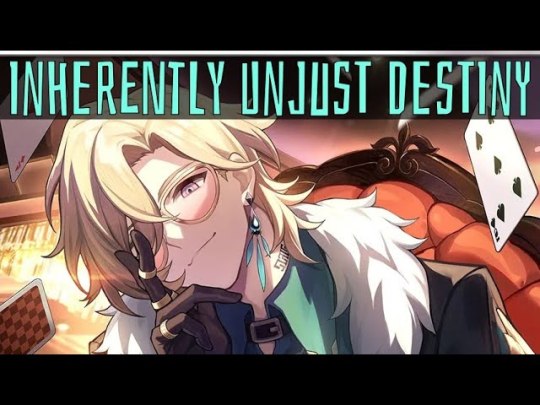
There's a reason his lightcone is called "Inherently Unjust Destiny." His own destiny, decided when he was born favored of an aeon, makes him a prisoner of the suffering that he can survive but never avoid.
We see how much this haunts him constantly throughout his experiences in 2.1...

To me, I would interpret the English banner name "Gilded Imprisonment" as much more related to how Aventurine's blessing, which is supposed to make him the favored, lucky, golden child, is actually nothing more than a thin veneer over the terrible destiny that binds him, continually costing him everything and everyone he loves.

On to the other point entirely, I think people might also really be misinterpreting that sentence about "escaping Jade's clutches." Again, I think this relates a lot to the fact that people are coming into Aventurine's character with this preconception of him as a prisoner to the IPC, so they're interpreting this sentence in the most literal way possible ("I want to get away from you"), but that is actually not what Aventurine is saying at all there.
Jade's rank in the IPC is P46. If Aventurine is promoted to P46, he would no longer be her subordinate. Therefore, when he says "I don't want to bet anything just to escape your clutches," this is actually a (vaguely snarky, to be sure) compliment. Aventurine is saying "I don't want you to think I'm engaging in a bet [that I know I'll win] because I dislike working for you."

It's supposed to be flattery. He's saying "Don't think I'm trying to get away from you, oh great Madam Jade. I wouldn't try to make any bets just to get out of being your underling."
I think it's got a healthy dose of sarcasm to be sure, because Jade herself would have trained Aventurine to snatch every chance to get ahead. So now he's in the hilarious situation of having to balance the expected respect to his mentor ("Of course I would never want to leave you! You're the best boss!") with the fact that his own mentor wants him to be cut-throat at all costs lolol.
It's irony-laced flattery for sure.

That's why his next line is "Well, if it's just a friendly bet though, then sure, I'll engage." He's saying "So long as you know I'm not betting because I dislike working for you, sure, I'll play along." Because he knows that's what he's supposed to do--as a Stoneheart, he should be seizing every opportunity to advance. He virtually has to make this bet that he'll be promoted just to demonstrate the desirous personality that Jade would be expecting.
And honestly, it's supposed to be a callback to their first scene together too. They literally add that to text so people can't miss it. Kakavasha came to Jade as a person "hungry" to rise up the chain, to change his circumstances. He's making the same bet again to suggest to her that he hasn't changed in the slightest even after his experiences in Penacony.
(Now, why he's trying to act like he hasn't changed in front of Jade is another story, and "Aventurine is out to destroy the IPC" conspiracy theorists can run wild with this one for sure.)
But yeah. That line... really does not mean what people think it means, apparently.
Anddddd I'll get to the character foils in another post; this was already long enough as-is! 😂
79 notes
·
View notes
Text
Gendered pronouns in Japanese vs English
In Revolutionary Girl Utena, the main character Utena is a girl (it says so in the title), but very conspicuously uses the masculine first person pronoun 僕 (boku) and dresses in (a variation of) the boys school uniform. Utena's gender, and gender in general, is a core theme of the work. And yet, I haven’t seen a single translation or analysis post where anyone considers using anything other than she/her for Utena when speaking of her in English. This made me wonder: how does one’s choice of pronouns in Japanese correspond to what one’s preferred pronouns would be in English?

There are 3 main differences between gendered pronouns in Japanese vs English
Japanese pronouns are used to refer to yourself (first-person), while English pronouns are used to refer to others (third-person)
The Japanese pronoun you use will differ based on context
Japanese pronouns signify more than just gender
Let’s look at each of these differences in turn and how these differences might lead to a seeming incongruity between one’s Japanese pronoun choice and one’s English pronoun choice (such as the 僕 (boku) vs she/her discrepancy with Utena).
Part 1: First-person vs third-person
While Japanese does technically have gendered third person pronouns (彼、彼女) they are used infrequently¹ and have much less cultural importance placed on them than English third person pronouns. Therefore, I would argue that the cultural equivalent of the gender-signifying third-person pronoun in English is the Japanese first-person pronoun. Much like English “pronouns in bio”, Japanese first-person pronoun choice is considered an expression of identity.
Japanese pronouns are used exclusively to refer to yourself, and therefore a speaker can change the pronoun they’re using for themself on a whim, sometimes mid-conversation, without it being much of an incident. Meanwhile in English, Marquis Bey argues that “Pronouns are like tiny vessels of verification that others are picking up what you are putting down” (2021). By having others use them and externally verify the internal truth of one’s gender, English pronouns, I believe, are seen as more truthful, less frivolous, than Japanese pronouns. They are seen as signifying an objective truth of the referent’s gender; if not objective then at least socially agreed-upon, while Japanese pronouns only signify how the subject feels at this particular moment — purely subjective.
Part 2: Context dependent pronoun use
Japanese speakers often don’t use just one pronoun. As you can see in the below chart, a young man using 俺 (ore) among friends might use 私 (watashi) or 自分 (jibun) when speaking to a teacher. This complicates the idea that these pronouns are gendered, because their gendering depends heavily on context. A man using 私 (watashi) to a teacher is gender-conforming, a man using 私 (watashi) while drinking with friends is gender-non-conforming. Again, this reinforces the relative instability of Japanese pronoun choice, and distances it from gender.

Part 3: Signifying more than gender
English pronouns signify little besides the gender of the antecedent. Because of this, pronouns in English have come to be a shorthand for expressing one’s own gender experience - they reflect an internal gendered truth. However, Japanese pronoun choice doesn’t reflect an “internal truth” of gender. It can signify multiple aspects of your self - gender, sexuality, personality.
For example, 僕 (boku) is used by gay men to communicate that they are bottoms, contrasted with the use of 俺 (ore) by tops. 僕 (boku) may also be used by softer, academic men and boys (in casual contexts - note that many men use 僕 (boku) in more formal contexts) as a personality signifier - maybe to communicate something as simplistic as “I’m not the kind of guy who’s into sports.” 俺 (ore) could be used by a butch lesbian who still strongly identifies as a woman, in order to signify sexuality and an assertive personality. 私 (watashi) may be used by people of all genders to convey professionalism. The list goes on.
I believe this is what’s happening with Utena - she is signifying her rebellion against traditional feminine gender roles with her use of 僕 (boku), but as part of this rebellion, she necessarily must still be a girl. Rather than saying “girls don’t use boku, so I’m not a girl”, her pronoun choice is saying “your conception of femininity is bullshit, girls can use boku too”.

Through translation, gendered assumptions need to be made, sometimes about real people. Remember that he/they, she/her, they/them are purely English linguistic constructs, and don’t correspond directly to one’s gender, just as they don’t correspond directly to the Japanese pronouns one might use. Imagine a scenario where you are translating a news story about a Japanese genderqueer person. The most ethical way to determine what pronouns they would prefer would be to get in contact with them and ask them, right? But what if they don’t speak English? Are you going to have to teach them English, and the nuances of English pronoun choice, before you can translate the piece? That would be ridiculous! It’s simply not a viable option². So you must make a gendered assumption based on all the factors - their Japanese pronoun use (context dependent!), their clothing, the way they present their body, their speech patterns, etc.
If translation is about rewriting the text as if it were originally in the target language, you must also rewrite the gender of those people and characters in the translation. The question you must ask yourself is: How does their gender presentation, which has been tailored to a Japanese-language understanding of gender, correspond to an equivalent English-language understanding of gender? This is an incredibly fraught decision, but nonetheless a necessary one. It’s an unsatisfying dilemma, and one that poignantly exposes the fickle, unstable, culture-dependent nature of gender.

Notes and References
¹ Usually in Japanese, speakers use the person’s name directly to address someone in second or third person
² And has colonialist undertones as a solution if you ask me - “You need to pick English pronouns! You ought to understand your gender through our language!”
Bey, Marquis— 2021 Re: [No Subject]—On Nonbinary Gender
Rose divider taken from this post
3K notes
·
View notes
Text
I think Ratio would be good with kids. Children are always so curious about the world around them and asking questions about whatever they can see.
But they aren't cursed with the same ignorance as those who are older, those who choose not to learn, they're just experiencing everything that there is for the first time. I think he's patient and gentle with kids, ensuring he explains things in ways that are easier to grasp and understand fully depending on how old they are.
I think he would try to smooth down his sharp tongue when dealing with kids. He of course doesn't sugarcoat or lie about things but changing up his word choice when explaining more difficult topics so that the child won't be further confused or upset.
I think he would go out of his way to ensure that children don't feel stupid for asking questions. He doesn't patronize them for not grasping why the sky is blue, or where the sun goes at night. He simply explains it to them as he would anyone else.

439 notes
·
View notes
Text
I feel like this has been said before but I am obsessed with the potential for a Silver Wolf and Aventurine friendship
You know Aventurine has always been around old or rich people. He absolutely does not know slang. He also really doesn't know much about technology aside from what he needs for his job and what he learned along the way.
Now imagine a hacker whose only real goal is just to beat games. She finds out there's this guy who has a magical amount of luck and she tracks him down and has him pull for her gacha games.
Silver Wolf realizes Aventurine's potential for meta in her gacha games and takes him under her wing when it comes to the internet. Aventurine can't be a decade older than her but he acts like a boomer on the internet. She has to fix this
Aventurine communicates in bad Facebook memes and full sentences and gets back replies that should belong in Homestuck
The comedic potential is immense
52 notes
·
View notes
Text
gotta get the plot rolling
link to rest of the series -> here





4K notes
·
View notes
Note
I wish everyone collectively understood aventurine’s character like you…things would be so much easier! I genuinely don’t understand how people keep getting his motivations wrong??? Could it be because some of the most popular Aven fanfics were written prior to his release? That could have contributed to some of the takes we tend to see about him…thoughts?
I struggled all day to come up with a concise way to answer this and couldn't think of one, so here, have a long-winded ramble:
I don't think early fic writers have much impact in the situation with Aventurine's character now, since most people can look at when a story was posted and go "Oh, this was before we had ____ information."
I think that Aventurine's problem is being a male character in a gacha game. Gacha game characters are designed to sell. Hoyo can sell female characters very, very easily. Give her huge tits and a visible underwear strap and you're good to go. I love all my guy friends, but I'm not gonna sugarcoat it: straight men are not the hardest audience to please. Hit a particular fetish (feet, spandex, dommy mommy), and you're gucci.
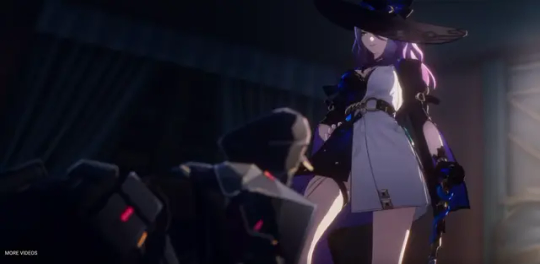
Nah, we all know why Jade's trailer is Like That.™
Male characters in gacha are harder to sell because women as consumers are a little harder to predict. Does every woman want a tall, ripped hunk? Shit, no, small cute boyish models like Aventurine are selling better now? Why?! Would a bad boy be more popular than a nice guy??? It's harder to account for women's tastes, especially because they are often (a little) less visually-oriented.
Hoyo is good at what they do though, and they've figured out that male characters sell very well when they possess at least one of two specific traits:
Endearing vulnerability/helplessness
Gay ship tease
Give a character both, like Aventurine? They might as well be printing money.
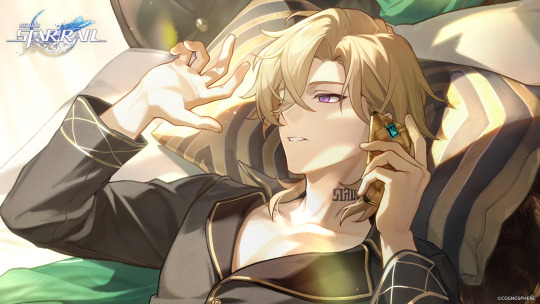
That sound you hear is Hoyo's stock prices rising.
So, from the very beginning, Hoyo is incentivized to create a character that appeals to people, a character people will want to crack their wallets open for. And they achieved this, first and foremost, by giving Aventurine traits that female players (in particular, but men too), find especially appealing: emotional and physical vulnerability.
We see Aventurine's pain. We sympathize with his grief. We identify with his struggle to make meaning of his difficult life. He's our woobie, blorbo, babygirl, whatever the hell they're calling it now.
He can't hide his suffering anymore. He's on the very edge. He's a dude in distress. He's surrounded by enemies! He misses his mama! He's been betrayed! No one understands him like you do, dear player!
The ultimate feeling evoked is: He needs to be saved.

When people talk about male power fantasies, I think they forget that women can experience them too, and "Emotionally vulnerable man that only I (or my favorite character) can fix" is actually a female power fantasy.
And from there it's really easy, right: the people who shell out cash to buy warps for their harmed-husbando feel like they've saved him; the people who are into mlm ships look for the nearest hot dude to be the savior Ratio was waiting for his time lol.
Morally and intellectually, this type of deep-down-golden-hearted, emotionally-wounded male character is very easy to digest. There is nothing to dislike about this type of character or role in the story: this character is a good guy who has just gone through so many terrible situations, whose victim status makes him endearing, and whose lack of agency means that any of the questionable or downright bad things he does are always the result of someone else forcing his hand, and never something he would have chosen himself.
His motivations are always clear and consistent: get free, heal, and live happily ever after.

Insert the Wreck-It Ralph meme: "Do people assume all your problems got solved when a big strong man showed up?" But to be fair, a big strong man did kind of solve Aventurine's problem, so--
Anyway, it's simple. It's straightforward. Morally, it's pretty cut and dry, black and white: Aventurine is our hero, which means everyone dictating the course of his miserable life is evil.
Hoyo is not remotely discouraging people from literally buying into this emotional appeal.
And trust me, I get it. I'll be the first to admit that hurt-comfort is its own entire genre in fandom because it is so appealing. People eat up Aventurine's tragic backstory like candy! The idea of watching a character go through hell at the hands of bad guys just to finally find a happy end is like the definition of everyone's favorite story.
In fact... people love Aventurine's suffering so much, they have invented whole new ways for him to suffer that aren't even in the game.
This is where we get all the headcanons that Aventurine was a sex slave, every single person he meets hates him because of his race, the Stonehearts are executioners holding knives to his throat, Jade enslaved him to the IPC with a lifelong contract, his material possessions belong to the company, the IPC is forcing him to take only the most dangerous missions where he is being required by his evil jailers to continually put his life on the line... You name it and I promise you, I can find a fanfic where Aventurine suffers from it. 😂

Bro can't even sleep in on his day off; life is so hard for this man.
Being serious: if the game is telling us that Aventurine is a victim... Why not make him the perfect victim?
Why not envision an Aventurine with no freedom, who bears no responsibility for any of the horrible situations he is in or any of the dubious things he does?
It's so natural to like that version of Aventurine, so appealing to see a totally powerless underdog use his own wits and charms to claw his way up to freedom. Or, if you're the kind who really relishes angst: It's even appealing to see Aventurine lose more. To delight in fics where he loses his wealth, where the IPC punishes him for past crimes while he's powerless to stop them... (I assure you, this is many people's cup of tea and the fanfics prove it!)
Ultimately, there's nothing wrong with liking characters who are exactly this straightforward! It's completely fine to embrace characters that are intentionally written to be morally above-board, whose primary role in the story is to generate angst by being a good person who suffers, or those characters who never show unlikable traits, bad decisions, or contradictory actions.
The problem is that that's just not who the game is telling us Aventurine is.

Hoyo may be capitalizing off people who love to envision poor Aventurine still living his life as a slave... But the game also needs to tell a complicated enough story overall to appeal to people who don't care about this specific husbando--Aventurine's role in the actual game's plot has to be interesting enough for almost everyone to appreciate it, not just Aventurine's simp squad. (Don't get mad, I'm in the simp squad with you.)
So his character doesn't stop at just being a pure-hearted victim who is still waiting to be saved.
Aventurine is not that easy to label, and I think the biggest struggle in this character's fandom right now is between people who prefer the even-more-angsty, still-a-slave Aventurine versus people who want a morally grey, self-destructive character instead.
To me personally, while I greatly understand the appeal of fanon!Aventurine and the joy of a really juicy angst fic where characters lose it all, I think that missing out on the depth that canon is suggesting would be a real loss on the fandom's part.
The character motivations that Aventurine shows in the game are complicated. They cancel each other out. They're basically self-harm! He makes almost every situation he's in worse for himself--on purpose.
He is a good person, but also a person who has done unspeakable things. He does have morals, but he's not above allowing those who don't have them to use him to their advantage.
He's both the victim and the victor. He's his own worst enemy. He's a lost little boy who's been making terrible decisions for himself since he was like eight years old, and a grown ass man who is barely managing to fake his way through an existence that destiny is not letting him quit.

This kind of character is a lot harder to embrace. He's done things that most people would find appalling--like willingly joining up with the organization that let his entire race be massacred. He's invented a whole new peacock persona to frivolously flaunt riches he doesn't even care about (Poison Dart Frog Self-Defense 101). He actively plays into racist stereotypes about his people to manipulate others through their preconceived expectations. He's made a mockery of his mother's and sister's hopes and dreams by endlessly trying to throw his own life away.
He has flaws! He bet everything he had on a ploy without doing his homework to find out if the people he was risking his life for were even still around. (Maybe he already knew, and couldn't bear to admit it, even to himself.) He's intentionally off-putting and obnoxious to everyone he meets (Poison Dart Frog Self-Defense 102). He terrifies everyone who gets close to him by (seemingly) carelessly throwing himself into the jaws of death without the slightest provocation.
He knowingly allows the IPC to exploit his power and talents for profit. Did everyone forget that his role in the Strategic Investment Department is asset liquidation?! Like, his actual day-to-day job is ruining people's lives. Canonically, Aventurine kills people when his deals go bad.

His motivations change off-screen in two lines of story text. We're told in one line that his biggest reason for joining the IPC was to make money to save the Avgin, then in the next line we find out that's impossible. And... then what? What motivations does he even have now? The whole point of his character arc from 2.0-2.1 is that he was on the edge of giving in to utter despair and nihilism because he couldn't even perceive a single reason to stay alive. He has no purpose in life before Penacony, and that didn't start with the Stonehearts at all??
People keep saying Aventurine was held in the IPC by golden handcuffs, but how do you tie down someone for whom profit is meaningless? What can you offer to a man whose only desire is to bring back something already lost forever? How do you imprison someone whose only definition of freedom is, canonically, death?

Working for the Stonehearts is obviously not healthy. But that's why Aventurine was doing it--because taking dangerous missions allowed him to put himself at risk. The job that he originally pursued hoping to save his people became a direct means to self-harm, and the IPC's only real role in that was just happily profiting off the results.
The journal entries for Aventurine's quests are there deliberately to tell the player what is on his mind, and none of it has to do with escaping from his job:

Like... Work is the least of this man's problems.
At really the risk of rambling on too long now, he's also just a massive walking contradiction:
Aventurine is among the most explicitly religious characters in the game, yet he's one of the only people in the entire game that we have ever seen actively question his people's aeon.
You might be tempted to think Aventurine's risky gambles with his life as an adult are a result of giving up after finding out about the Avgin massacre... Butttt no, Hoyo makes sure to tell us that even at knee-high in the Sigonian desert, Kakavasha was already willing to risk himself in a fight to the death against monsters because even back then he found his own life to have less value than a single memento.
He's the "chosen one" who will lead his people to prosperity... except they're all dead.
He's explicitly suicidal... andddd also a pathstrider of Preservation.
He wants to die... He doesn't want to die. He wants to make it end, yet goes to staggering lengths to continually survive. (Every plan risks his life on purpose--but every plan's win condition is also to live.) He life is the chip tossed down, but his hand is trembling beneath the table. When faced with an otherwise unsurvivable situation, Aventurine literally became a winner of the Hunger Games. He beat other innocent people to death with his own chain-bound hands just to come out alive.

He knows the IPC failed the Avgin and left them to die... and he still willingly sought out a position of power in their organization. Maybe he really is after revenge... but maybe not.
He starts his journey in the IPC with a truly noble goal in mind: to help his people using his newfound wealth and power. He's a good guy who did genuinely want to save the Avgin and repay all those who helped him. But once it became clear he was too late, once it was obvious he would have no use at all for that monetary wealth and power he risked his life to get... What did he do with it? Unlike Jade, we don't see him over here donating to orphanages. (I'm not that heartless; I'm sure he does actually do a lot of good things with his money on the side, but the point is that the game does not show us that--it shows us, over and over again, Aventurine putting on a wasteful, over-indulgent persona toward wealth. We've supposed to feel how meaningless money is to him, how meaningless everything is becoming to him.)
He outright refuses to use underhanded tactics or to cheat at gambles, which is meant to show us that's he's more morally upright than his coworkers. There's an entire exchange where he says that he'll never stoop to using manipulation the way Opal does. But... he doesn't have any issue fulfilling Opal's exact agenda. He was never remotely morally conflicted about denying the Penaconians their freedom by dragging Penacony back under IPC control.

He's willing to risk his own life, which is one thing--but he's also willing to risk other people's well-being. Topaz accuses him of constantly egging their clients on into dangerous situations; we've actively seen him shove a gun into Ratio's hands and pull the trigger with no care for how Ratio would feel about that on their very first meeting... Dragging the Astral Express crew into the entire Penacony plan in the first place was exceedingly dangerous...
To me, I just think it's vital to understand his character through the lens of these contradictions because they demonstrate the extreme polarity of Aventurine's life: from rags to riches, from powerless to empowered by multiple aeons, from willing to kill to survive to killing himself... He has quite literally lived a life of "all or nothing," and while he is the victim of many terrible situations out of his control, his arc as a character involves facing the truth of himself and the future his own actions are hurtling him toward.

Frankly, the Aventurine that canon is suggesting is a little annoying. You want to grab him by the shoulders, shake him, and say "Why are you like this?!" And he won't even have an answer for you, because he doesn't even know why he's still alive.
In the end, to me, this is so, so much more interesting. I can read an endless supply of hurt-comfort fics where Aventurine escapes the evil IPC and Ratio is there to fill the void in his life with the power of love and catcakes and be a perfectly happy clam online, but I want canon to continue to serve us this incredible mess of a man who constantly takes one step forward and two steps back.
Who is fully aware of his role as a cog in the grotesque profit-wheel of cosmic capitalism and still manages to say he never changed from the rags-wearing desert rat of the Sigonian wastes.
Who over and over again flirts with nihility but, ultimately, even if he has to wrest it from the grip of the gods themselves with bloody, chain-bound hands, chooses life.

308 notes
·
View notes
Text
"maybe in another life-" no. there isn't one. this is it. this is your life and it's ending one minute at a time.
61 notes
·
View notes
Text
Double Indemnity, Spellbound and how a retroactive plot twist kicked the communities ass (which also has some VERY interesting implications for Aventio)
I had a very enlightening conversation on TikTok about the nature of these two romance/thrillers, and while unfortunately, I have no idea how to watch them, the plot synopses I’ve seen and analysis other people have made have caused me to come to this conclusion/interpretation of these references:
On the first viewing of the Double Indemnity questline, the reference to the DI movie is meant to be played straight, with Aventurine and Ratio being just as doomed to fail as they are in the movie, and their relationship as equally as toxic and fake.
On second viewing, it’s the complete opposite, and the track (and other movie reference) you receive at the end, Spellbound, proves it.
Let’s start with Double Indemnity.
Also disclaimer I’m gonna be over simplifying the plot/themes of these movies because a) both are singular references, DI is only referenced in the name of the quest itself and Spellbound is only referenced in a track you receive once you complete DI, and references this small probably aren’t meant to be anything more than a fun Easter egg for those who notice it b) this is hoyoverse they aren’t clever enough for that anyways c) the nature of references isn’t going to be having everything be the exact same anyways, so I’m just going to go with the overall interpretation of DI + Spellbound/their impact, picking the stuff which aligns with the actual plot of the DI quest, I don’t care what happens in one frame at 30:01.56 minutes in and neither do the writers
Anyways, how does the Double Indemnity reference on the first viewing seem?
On our first play through of the Double Indemnity quest, we are made to believe that Dr. Ratio and Aventurine do not trust each other, but they are begrudgingly working together for the sake of stealing Penacony for the IPC. Then, Aventurine makes it seem as if he wishes to use the singer Robin’s- also the sister of Sunday, the head of the Oak Family and the one they are negotiating with- death as a means to pressure Sunday into forking over some of the Family’s secrets, which Aventurine will then use against him in future negotiations.
With this setup, the Double Indemnity reference is a solemn warning- Aventurine and Ratio will fail.
You see, in the movie, Phyllis Dietrechson intends to kill her husband in order to earn the money from the Double Indemnity clause (which is a real legal thing btw!), roping in one Walter Neff when he falls for her. However, their relationship isn’t stable and in the end, Walter betrays Phyllis, ratting her out to the investigator Keyes, ultimately meaning they don’t earn the DI clause, also killing Phyllis in the process.
Hopefully you can already see where I’m going with this, but it’s time to draw some fun parallels.
Sunday is Keyes, Ratio is Walter, Aventurine is Phyliss and Robin is Phyliss’s husband.
Although Aventurine a) isn’t married to Robin and b) he didn’t actually kill her, he is the one who witnessed her “death” and in the first viewing of the Double Indemnity quest, we are made to believe he intends to profit off of it, although this time the payout isn’t money: it’s Penacony.
To do this, he enlists the help of Ratio- albeit not seducing him, but still convincing him to help nonetheless- and together they go to meet Sunday for negotiations.
However, Ratio “betrayed” Aventurine, ratting him out to Sunday behind his back and informing him of his plan, which mirrors how Walter confesses to Keyes. This results in Aventurine being sentenced to death, much like how Phyllis dies by Walter’s hand, Aventurine seems like he will die by Ratio’s, calling him a wretch before slinking off.
And there you go, their partnership is as doomed as the one in the movie, failing because their trust + love didn’t hold up till the end, a devious foreshadowing.
At least, that’s how it seems on the first playthrough.
Because Aventurine and Ratio’s plan SUCCEEDS.
And on the second viewing, knowing that the betrayal is fake, you realize they succeed because they do the one thing the people in DI (and I’ll get to Spellbound) DONT do- they actually TRUST each other.
Ratio and Aventurine’s plot is a success. And it’s because they deliberately made it seem like they were doing a Double Indemnity plot. Like they were going to make the same mistakes as the characters in the movie. Sunday falls for the false appearance hook, line and sinker, and that’s his downfall.
They win because they TRUST each other, you can even say because they actually LOVE each other, unlike the characters in the movie, where it’s more list than anything else. Walter and Phyllis don’t make it together to the end but Ratio and Aventurine DO, and they get to continue on with their lives because of it. The reference to Double Indemnity in this quest is genius because it works both before and after you learn the retroactive twist of Penacony. It makes you believe Aventurine + Ratio are doomed to fail, and it makes you realize they were always going to succeed, expertly dawning the false appearances Sunday expects from them, becoming literal actors playing out the roles of two people who will fall short due to their selfishness. Sunday believes he’s seen this film before which is why he BUYS IT, and god it’s just beautiful looking back on it. He thinks he’s Keyes about to uncover a dastardly plot to profit off his sisters death, and in turn he paints Ratio and Aventurine with the identities of those he believes would do such a thing, which they do their best to play into. Ugh it’s amazing.
And now, for Spellbound.

You receive this track after completing Double Indemnity, containing the description above.
Now, this is a reference to Spellbound, another one of Hitchcock’s films.
The main characters in this one are Dr. Anthony Edwards, a man suffering from amnesia, and Dr. Constance Peterson, a psychoanalyst who he was meant to replace, who discovers a dark secret about Edward’s while they fall for one another; he’s an imposter. He believes he killed the real Dr. Edward’s, but she thinks he’s just suffering from a guilt complex. Fake Edward’s goes missing, and the real Edward’s assistant arrived and informs them that he’s missing. She finds Fake Edward again, living under the pseudonym John Brown, and although he tries to leave, she convinces him to stay, telling him that with the help of her mentor, psychoanalysis can help recover his lost memories.
Through an incredibly complicated psychoanalysis of dream, Constance begins to uncover the truth- learning the person who believes himself to be Dr. Edward’s (and is using the pseudonym John Brown) is actually a man named John Ballantyne. Ballantyne accidentally caused the death of his younger brother in the past, resulting in his deep guilt, as well as recalling the location where the real Edwards died- skiing off a cliff to his death. With his memories, they find the body, but it has a bullet wound, so Ballantyne is taken into custody.
However, her boss, Dr. Murchison lets it slip that he actually used to know (and didn’t like) Dr. Edwards, and through another complicated sequence gets him to confess his guilt and ultimately kill himself, which frees Ballantyne, ending the movie with the two going on a honeymoon.
So, what does this mean in the context of the quest line?
Well, let’s say Ballantyne and Constance are representative of Ratio and Aventurine respectively.
“Every psychoanalyst must first have someone else diagnose them.”
If we read Aventurine as the psychoanalyst (Constance) and Ratio as the diagnoser/doctor (Ballantyne), it reveals an interesting interpretation.
That being that they knew the truth from the start/ they had already succeeded.
Or in other words, unlike in Double Indemnity, in Spellbound, they actually succeed.
In the film, Constance is the one doing the diagnosing, the one trying to figure out the truth, and you can see that in Aventurine pretending he’s trying to find out the truth behind Robin’s death. However, in the DI quest, it’s the opposite. Ratio’s as Ballantyne is the one doing the diagnosing for the psychoanalysist, Constance, or rather, Aventurine.
To diagnose someone, you must be very familiar with them, or at the very least the ailment plaguing them, and Ratio he knows Aventurine through and through at the start, and what plagues him (his own sense of meaninglessness) unlike the protagonists in Spellbound who despite falling for one another quickly, don’t begin being intimately familiar with one another.
In this way, they have already succeeded. Aventurine and Ratio already know one another, and while they might not know the reason behind Robin’s death, that was never what they were searching for in the beginning, meaning they effectively can skip through all the drama (aka the ups and downs of Spellbound, finding out the truth behind Robin’s/Edwards’ death), and reach their happy ending- a honeymoon; or in DI’s case, Aventurine attaining his cornerstone, and fulfilling his end of the plan.
Interestingly, Aventurine slots into the role of Ballantyne and Ratio as Constance equally well, with the phone call Constance makes to save Ballantyne being reminiscent of the note Ratio makes to save Aventurine, as well as Aventurine being the replacement, or in the sense, the one to find the truth about Robin.
Personally, I think Aventurine and Ratio are reminiscent of both the main leads in Spellbound, which is why it’s complicated to discern the meaning of the reference. Oh how I wish I knew what the original Chinese description for this was (if you do please tell me 🙏).
Is it just meant to signify them being in love? Is it meant to signify that they will succeed, due to how well they know each other? Is it both, which is what the inclusion of Double Indemnity (the movie) suggests?
Either way, it adds onto the already present idea that the trust between Aventurine and Ratio is what allowed them to succeed in Penacony, and that’s not just something expressed by these movie references.
Think Aventurines Eidolons: Stag Hunt Game and Prisoner’s Dilemma, both of which are game theories about trust. Or how Aventurine says that Ratio knows him best, or how Ratio entrusts Aventurine with close secrets of his, like him being the “Genius” of the council of Mundanites.
“Do you trust me?” “That depends on you.”
These are 2 lines in their 2.0 conversation that really stick out to me. Ratio will always offer his trust so long as Aventurine can prove himself worthy of it, and as we have seen, Aventurine always delivers, proving himself long before Penacony in the Final Victor lightcone, albeit in his weird homoerotic way.
Therefore Ratio will always trust him.
And because of that, they win.
Now whether you take the deep trust between them to be romantic or platonic, or infer the literal honeymoon at the end of Spellbound to mean something for Aventio, either way the feeling absolutely there, and it’s crucial for an understanding of their relationship.
Also damn, the retroactive plot twist fucking slaps.
139 notes
·
View notes
Text
hey so protip if you have abusive parents and need to get around the house as quietly as possible, stay close to furniture and other heavy stuff because the floor is settled there and it’s less likely to creak
495K notes
·
View notes
Text
Something something me and ma mamah rolled into the distant fog
little those she know I'm a nasty dog <3 (I'm actually Black Swan kind of royally fucked)
Actually don't need therapy, I need Acheron in this skin (CARNALLY 👁️👁️)
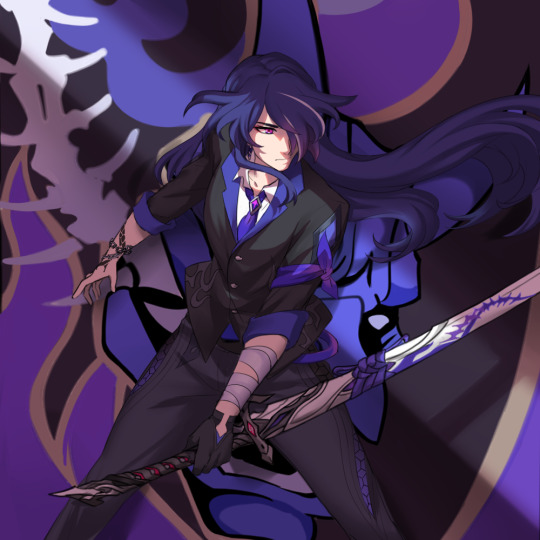
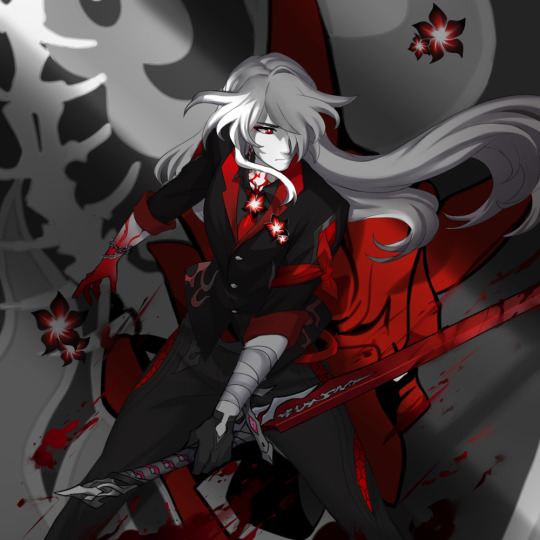
Commission of Acheron in a suit that I designed! With the monochrome version!
9K notes
·
View notes
Text
He is such a cutie when he does that >:( big eyed face <3
Photoshoot of Dr. Ratio making faces and being dramatic.
Bonus Aventurine with his :3 face
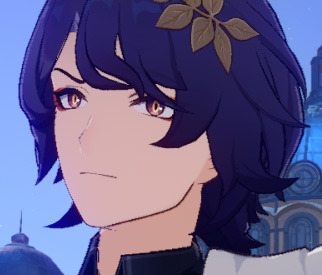



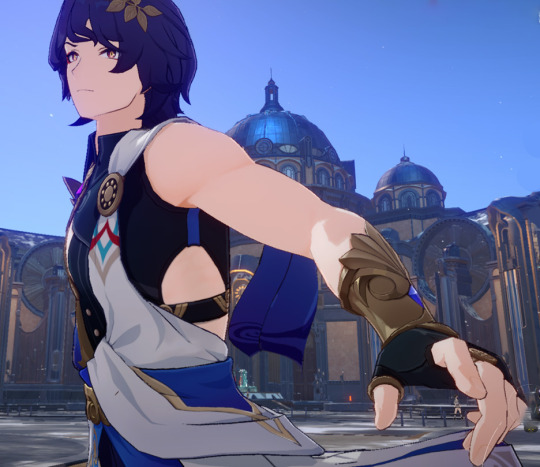
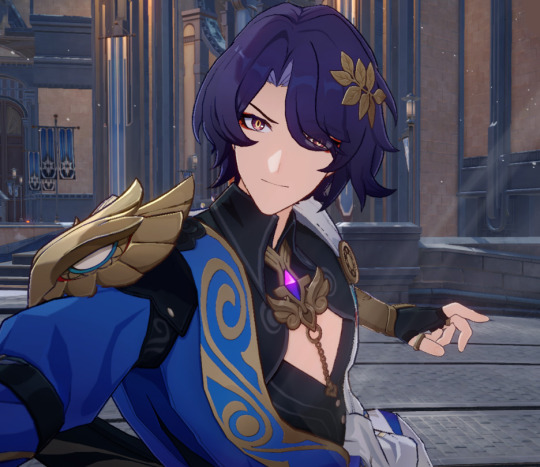





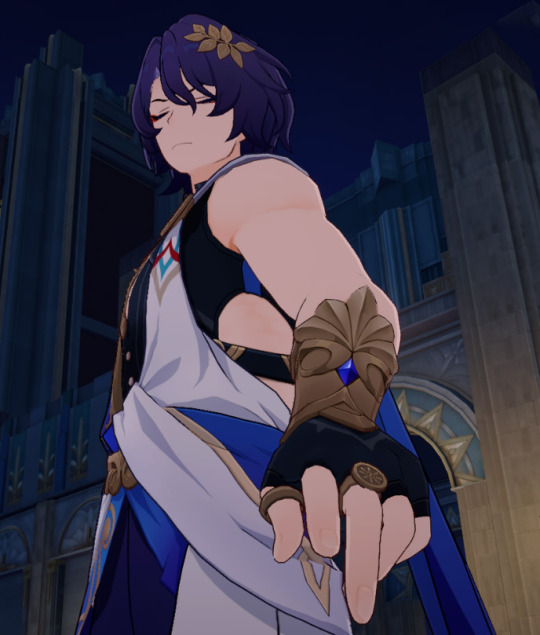
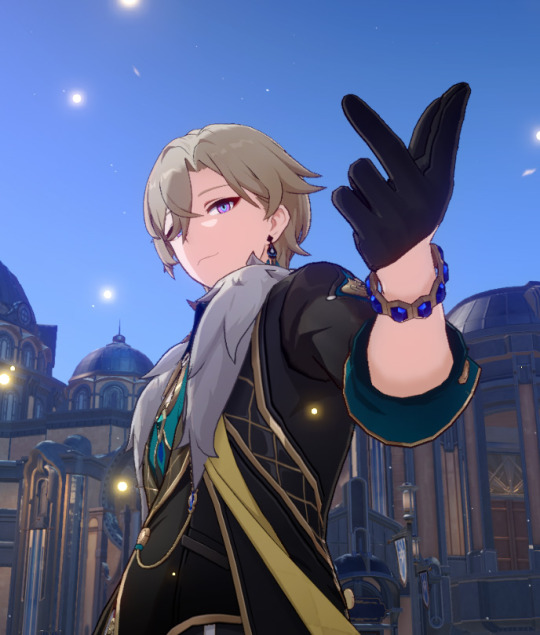

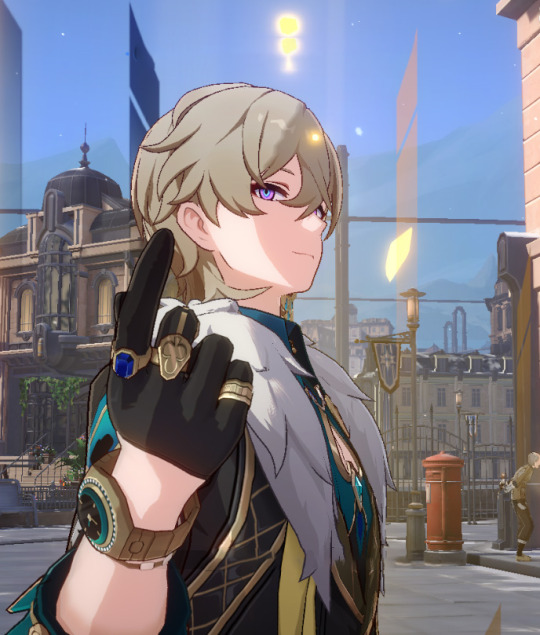
Bonus 2, warning - obscene gesture, duh


306 notes
·
View notes
Text
You are going to laugh until your stomach hurts again. You're going to be in awe of a sunset. Watch your favorite show while you eat your favorite food. Find money on the street. Discover a great band you haven't heard of before. You will find your way back.
129K notes
·
View notes
Text
I actually really like how Ruan Mei isn't a stereotypical mad scientist and is generally a very socially awkward person who doesn't really know how to process emotional connections and social ques with people. I would argue that she exhibits signs of an individual within the spectrum, and consciously knows how she comes across as cold and distant to people. It actually kinda shows when she interacts with Stelle( Yes im using the Femc as an example because that's who I play as in Star rail) She uses a truth serum on her because she doesn't know how to trust people easily, yet still makes an effort to try and bond with her and tell her her inner most thoughts and personal history. And even shows remorse for not telling her more about the emanator of propagation clone, and states that her not telling her stemmed more from not knowing how to communicate with others.
She finds emotional bonds to be fleeting, yet still craved to have a confidant to talk to and open herself up to. It's actually kind of sweet that the very last conversation Stelle has right after she tells you that it's better for both of them if they forget about each other, can be Stelle promising her that she won't forget about Ruan Mei, even if her memories are wiped completely. And Ruan Mei acknowledging Stelles determination and probably happy that she was able to form a sort of bond with someone, no matter how fleeting it might be.




44 notes
·
View notes
Note
This is what happens when ur boyfriend turns into a duck that loses it's human brain but still (annoyingly) retains the obnoxious personality and the want to gamble (to your (Veritas Ratio) dismay)
so now you have to take care of ur weird no but yes but actually wtf situationship coworker while trying to find a way to turn him back
he is also (very annoyingly) turned into the animal you have been hyperfixated on for your whole life to the point you can't even remember when it started (at this point you might have just came out of ur mamah like this)
so that makes him look even more (ANNOYINGLY) cuter to you then usual
oh and this is how you found him after you came back from ur teacher job (he found the huge back of duck food and turned into a chong)
(you hope this won't translate when you find a way to turn him back cause yk he is probably gonna be upset about it and be a problem for him that you didn't intend)
(another part of you also hopes it does translate cause Nous it would be SO funny..... and he would look cute with some chub on him HOW SAID THAT!?)
Also he likes to wear those stupid glasses all the time for some reason and at this point you think it might be just to mess with you
He also entered on you when you were having a bath and started flapping it's wings like he wanted to join and all your self restrain and shame flew right out the window cause he (VERY ANNOYINGLY) looked to cute for you to refuse
"This must be his duck needs speaking" you tell yourself and try not to think about it further as you got this chonky duck come to you and snuggling in ur boobah
.....
Veritasbrain.exe has stopped working
You instantly pull him away but he looks at you sad and dejected and swims on the other side of the bathtub and stands with his back at you (ok drama queen)
And you just down at ur own reflection in the water and wonder HOW in the world you managed to end up in this situation and very reluctantly tell him to "come here" and let him snuggle
Because you feel bad. Because whatever this behavior is must be some part of Aventurine that wants affection (right?) and knowing the little you know about his life you definitely could see why. Because you are a buffon in love with ur currently-turned-duck crush and if you can't have him snuggle with you in human form then fuck it let it be in this form. Especially since he was the one who initiated the action.
You have no clue if he will remember all this or not but you just hope he won't be mad at you or think of you weirdly for this. You just wanted to give him ur affection after all (like you've been craving to do all this time before this whole duck fiasco)
(Aventurine does remember.... everything in fact. His whole mental state was something akin to being hit with a stupidnator beam, turning his brain mush to something free of thoughts that might hold him back to do things. If he wants to eat that whole bag of duck food he will cause that's what he wants to do rn and he doesn't have the mental capacity to think about it further.)
You pet him and can't hold back anymore and vent about everything that is them and how them makes you feel and basically confess to your very on-cloud-line relaxed turned duck crush
Something Something, you managed to find a way to turn him back
Something something Aventurine acts like he doesn't remember anything when Ratio asks
Something something you (very awkwardly) turn back to ur own lifes until you are put on a mission together and something gets Aventurin to confess that, yes, he does in fact remember everything.
Something something happy ending for these fools (shouldn't. I hate them. *incorrect buzzer*) they confess and talk it out. Aventurine suggests having a bath together again and Ratio rolls his eyes exasperated.
They cuddle in the bath and Aven says something snarky that makes Ratio say "I think I liked having a bath with your duck version way more" and Aventurine says "By how many pictures I remember you took of me as a duck I don't doubt you liked me I was all feathers"
.... "You remember that too!?"
"I told you doc. I remember everything."
"....Nous give me strength ughhh" *puts head in hands*
Aventurine lets out a laugh that sounds so melodic, angelic and true that you can't help but thank the universe it let you two meat and faith allowed you to be his lover and have his love, laugh and everything that is the man you have fallen for.
.....
and you of course have to rain on his parade cause you can't let him have the win by reminding him of how he ate that whole bag of duck food and had to burn those calories down after he turned back 🤭
--------------------------------------------------------------
.....
I HATE THEM SM AGHDHSJSJSLSNSI
(this is so self indulgent brainrot at it's peak but idc🥰)
get them out of my head rn, they make me S S S ICK
😮💨
I love how you draw hoyo characters as animals. What would Aventurine be if I may ask?
Peacock, he does build/act like a peacock. Even Sparkle also call him a peacock, if I recall.
This is a peacock.

549 notes
·
View notes


